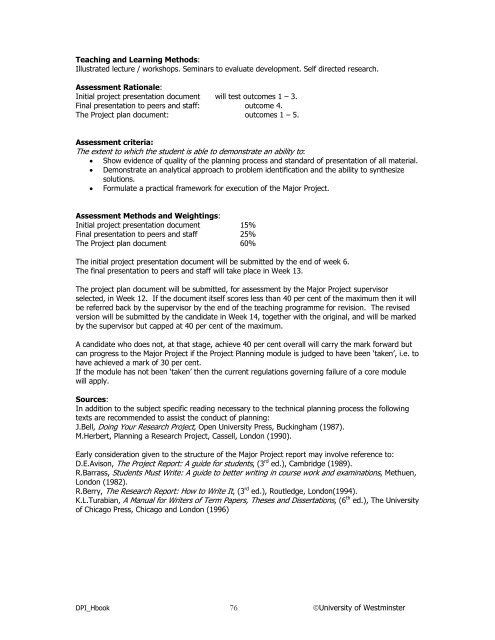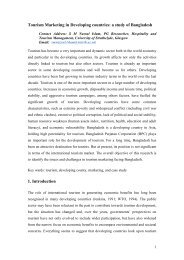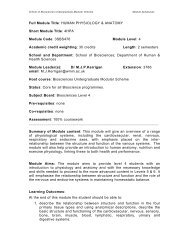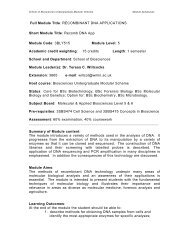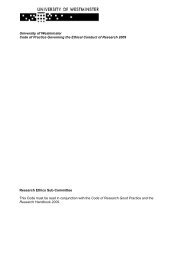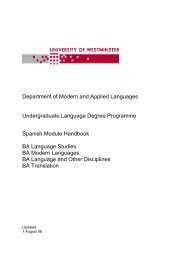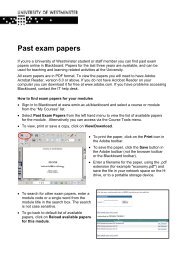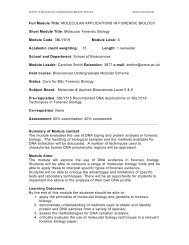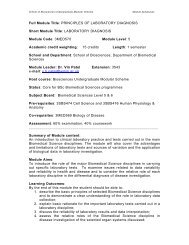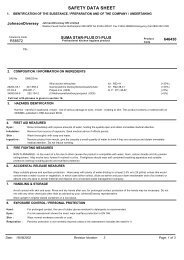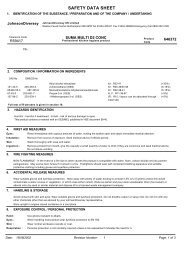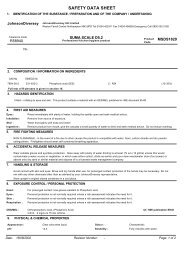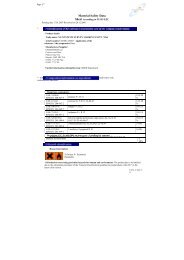CONTENTS 1. Introduction 1.1 Course Outline 1 1.2 Introduction ...
CONTENTS 1. Introduction 1.1 Course Outline 1 1.2 Introduction ...
CONTENTS 1. Introduction 1.1 Course Outline 1 1.2 Introduction ...
You also want an ePaper? Increase the reach of your titles
YUMPU automatically turns print PDFs into web optimized ePapers that Google loves.
Teaching and Learning Methods:<br />
Illustrated lecture / workshops. Seminars to evaluate development. Self directed research.<br />
Assessment Rationale:<br />
Initial project presentation document will test outcomes 1 – 3.<br />
Final presentation to peers and staff: outcome 4.<br />
The Project plan document: outcomes 1 – 5.<br />
Assessment criteria:<br />
The extent to which the student is able to demonstrate an ability to:<br />
• Show evidence of quality of the planning process and standard of presentation of all material.<br />
• Demonstrate an analytical approach to problem identification and the ability to synthesize<br />
solutions.<br />
• Formulate a practical framework for execution of the Major Project.<br />
Assessment Methods and Weightings:<br />
Initial project presentation document 15%<br />
Final presentation to peers and staff 25%<br />
The Project plan document 60%<br />
The initial project presentation document will be submitted by the end of week 6.<br />
The final presentation to peers and staff will take place in Week 13.<br />
The project plan document will be submitted, for assessment by the Major Project supervisor<br />
selected, in Week 12. If the document itself scores less than 40 per cent of the maximum then it will<br />
be referred back by the supervisor by the end of the teaching programme for revision. The revised<br />
version will be submitted by the candidate in Week 14, together with the original, and will be marked<br />
by the supervisor but capped at 40 per cent of the maximum.<br />
A candidate who does not, at that stage, achieve 40 per cent overall will carry the mark forward but<br />
can progress to the Major Project if the Project Planning module is judged to have been ‘taken’, i.e. to<br />
have achieved a mark of 30 per cent.<br />
If the module has not been ‘taken’ then the current regulations governing failure of a core module<br />
will apply.<br />
Sources:<br />
In addition to the subject specific reading necessary to the technical planning process the following<br />
texts are recommended to assist the conduct of planning:<br />
J.Bell, Doing Your Research Project, Open University Press, Buckingham (1987).<br />
M.Herbert, Planning a Research Project, Cassell, London (1990).<br />
Early consideration given to the structure of the Major Project report may involve reference to:<br />
D.E.Avison, The Project Report: A guide for students, (3 rd ed.), Cambridge (1989).<br />
R.Barrass, Students Must Write: A guide to better writing in course work and examinations, Methuen,<br />
London (1982).<br />
R.Berry, The Research Report: How to Write It, (3 rd ed.), Routledge, London(1994).<br />
K.L.Turabian, A Manual for Writers of Term Papers, Theses and Dissertations, (6 th ed.), The University<br />
of Chicago Press, Chicago and London (1996)<br />
DPI_Hbook 76 ©University of Westminster


